The best vintage lenses that are stylish and inexpensive.
Whether you are deliberately collecting the best vintage lenses or going through the old equipment someone left you, it is important to estimate the condition of such optics correctly. If you’re uncertain how to select and inspect old-time lenses, read the tips I’ve provided before investing in a vintage piece. They will be helpful even if you’re buying online, although it will be harder to check if you are buying a working lens.
Below, you will find a list of the greatest time-tested vintage optics. Make sure to also read the closing tips as they are helpful for selecting the right piece for your camera, especially if you plan to attach it to a modern device.
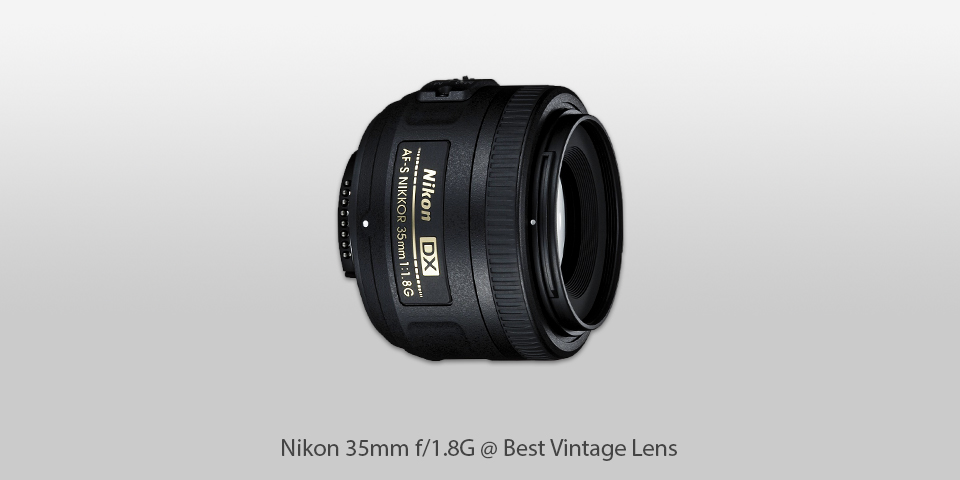
Mount:AF | Diaphragm blades: 7 | Autofocus: good| Min focus distance: 0.3 m | Max magnification: 0.16x| Filter thread: 52 mm | Dimensions (WxL): 35 mm | Weight: 7.05 ounces
⊕ Impressive sharpness
⊕ Small and light body
⊕ Sensible price
⊖ Some light barrel distortion
If you are interested in vintage Nikkor lenses, this would be a great purchase for general use. Being pretty compact, it allows you to work without attracting attention. Its angle and focus mimic what the human eye can see naturally, and landscapes benefit greatly from such capturing.
It has a good seven-blade diaphragm that helps with softening the out-of-focus elements beautifully. You can combine it with a DX-format SLR and this will give you the angle of view equivalent to 50mm.
The lens itself is supplied with a bunch of helpful items like the front and rear caps with a soft carrier for transporting or storing, a detachable lens hood. It has a 5-year warranty as well.
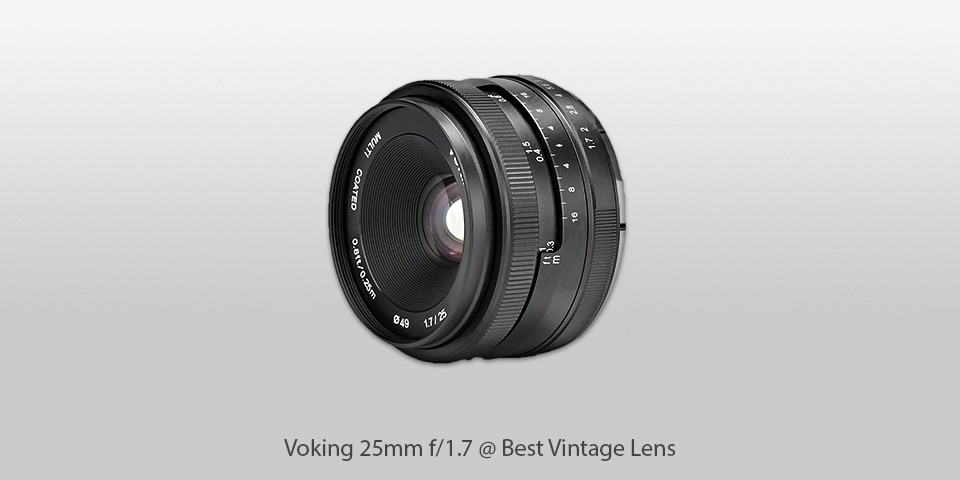
Mount: E | Diaphragm blades: 7 | Autofocus:good | Min focus distance: 0.25m | Max magnification: 0.14x | Filter thread: 49 mm | Dimensions (WxL): 25 mm | Weight: 8.8 ounces
⊕ Superb central sharpness
⊕ Effective flare elimination
⊕ Incorporated hood
⊖ Blurs the edges till f/2
This vintage wide angle lens is great for portraiture. It operates on 7 elements in 5 groups with some enhancing coating to make the results even more beautiful. It can focus from 0.25m and allows for a very wide aperture. The bokeh effect it creates is just perfect.
The lens with its APS-C oriented metal body is small and lightweight, intended for the Fujifilm X-Mount. Being an old piece of optics, it will not “communicate” with your camera so make sure to change the setting to “M mode” or “Release without lens” to shoot.
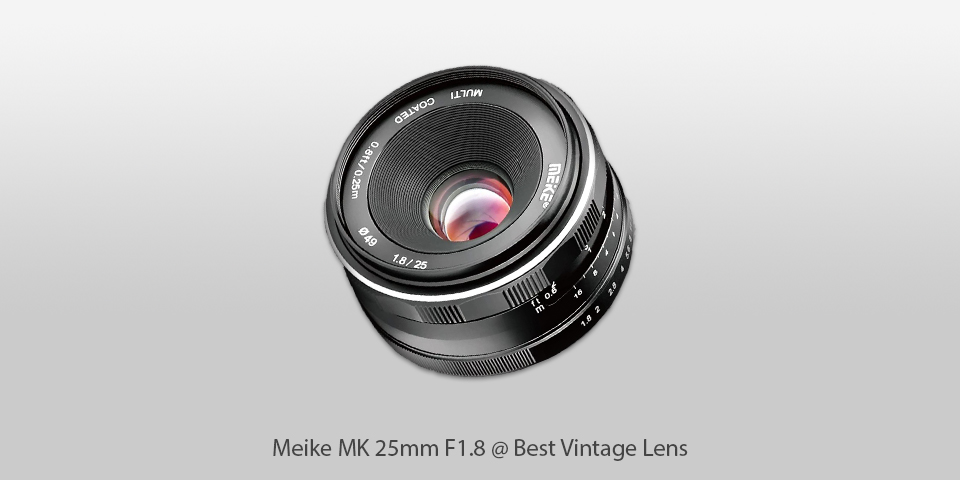
Mount:X | Diaphragm blades: 9 | Autofocus: good | Min focus distance: 0.65m | Max magnification: 0.08x | Filter thread: 50 mm | Dimensions (WxL): 50 mm | Weight: 11.2 ounces
⊕ Fine sharpness in the center
⊕ Entirely manual in operation
⊕ Affordable
⊖ Softness of edges
This is not a lens to be used on full-frame cameras. However, if you can switch an APS-C Mode on, you can still work with it. It makes sense to do a thorough check and maybe confirm with a seller to make sure you can work with this lens.
Its qualities make it perfect for portraiture but there are other uses you can put it to with much success, especially if those require focusing in 1-5 m range. You will be able to create beautiful bokeh and do advanced work with the depth of field. Sure, as an old lens it won’t allow you to autofocus quickly and precisely. You can help yourself with a few digital camera features like live digital zoom and sharpness highlighting.
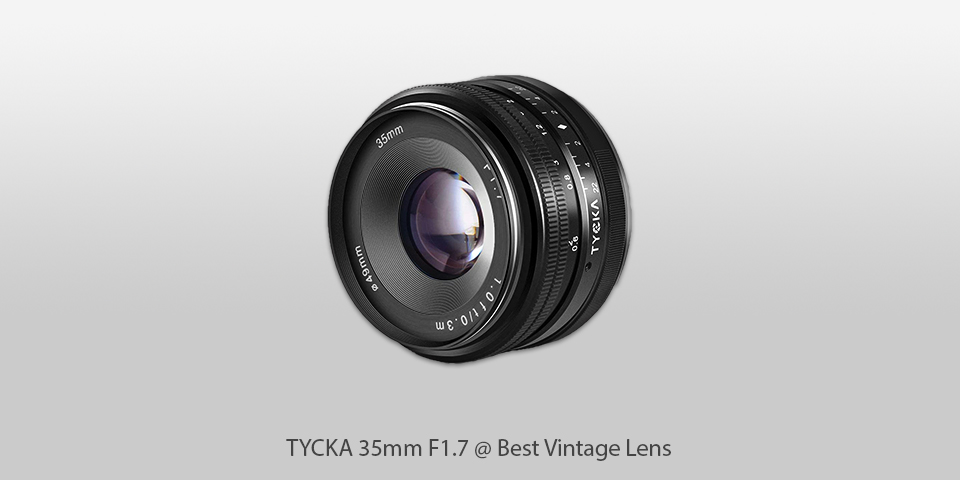
Mount: F| Diaphragm blades: 9 | Autofocus:good | Min focus distance: 03 m | Max magnification: 0.1x | Filter thread: 35 mm | Dimensions (WxL): 35 mm | Weight: 14.4 ounces
⊕ Wide compatibility
⊕ Totally manual
⊕ Supplied in a waterproof bag
⊖ Autofocus issues
You can easily call it one of the very best vintage lenses. If you only consider two factors, its wide aperture and angle, these alone can make the price of a lens sky-high. Here you also have a robust metal body, plus the lens is multi-layered. Its initial mount is E but it can also be FE.
The adapters for these are fairly common and comfortable in use so you will not feel inconvenienced. With this large aperture, you can capture detailed images even if the lighting is poor. Being entirely manual, this lens gives you full freedom to experiment with focus and interesting combinations of settings.
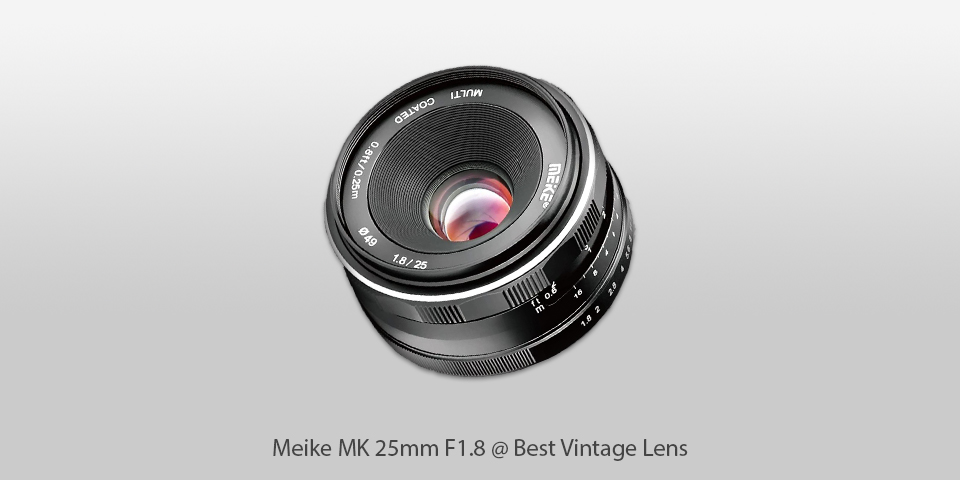
Mount: MK | Diaphragm blades: 12 | Autofocus: good | Min focus distance: 0.25m | Max magnification: 0.113x | Filter thread:49 mm | Dimensions (WxL):25 mm | Weight: g
⊕ Great for photography
⊕ Compact
⊖ Edges soft
This lens was manufactured with Sony APS-C cameras in mind. It is a prime and shoots at a very wide angle. Coupled with an impressive aperture range of f/1.8-16, it creates beautiful images. It can be employed mainly in portraiture and landscape photography but some interesting results can also be obtained in product photography.
On casual shots like family gatherings and such, it can create quite a warm atmosphere. The lens itself is quite robust, being encased in metal entirely, including the removable lid. It is, however, small and portable.
This old piece of optics shows the best results when paired with a modern camera that has focus peaking. This allows you to check whether you have the focus where you prefer it.
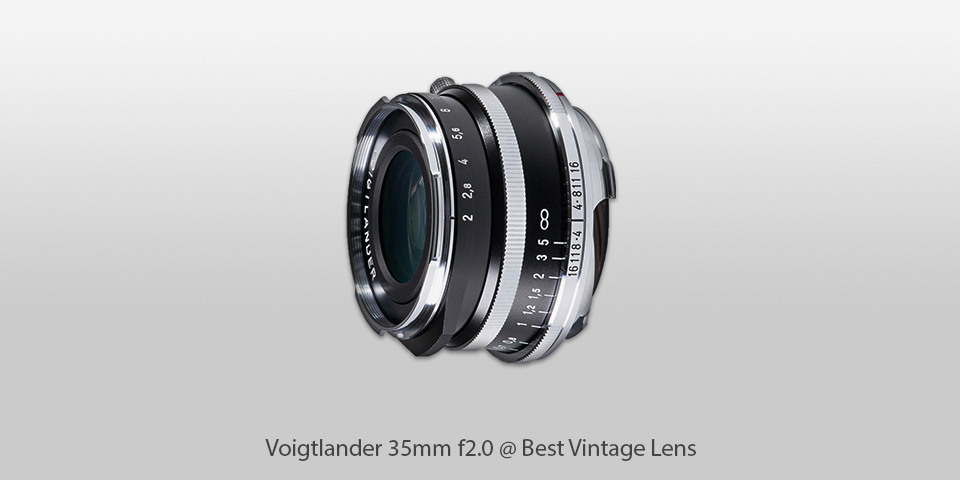
Mount: VM | Diaphragm blades: 10 | Autofocus: good | Min focus distance: 58 cm. | Max magnification: 0.11 x | Filter thread: 35 mm | Dimensions (WxL): 35 mm | Weight: 5.92 ounces
⊕ Superb precision with manual focusing
⊕ Indestructible all-metal barrel
⊕ Classical 1950s style
⊖ Some barrel distortion
If you want a more performant vintage camera lens capable of matching modern optics in quality, this model is the best offer. It has a convenient VM mount and works great with rangefinder cameras. It is styled the way the classical lenses of the past were, making for a jaunty accessory. It is just one model in a line that the company released around 2013.
They have all been well received, finding admirers in different genres. The reception has been so welcoming indeed that the company is extending the line. So if you’re strongly into vintage lenses for one reason or another, investigate what Cosina Co., Ltd. has to offer so far.
There are two options with comparable performance. The Ultron Vintage Line 35mm F2 Aspherical VM is a portable wide-angle model with the min focus distance of 58 mm. The Color-Skopar Vintage Line 21mm F3.5 is a small-sized super-wide lens with a 50mm minimum focus distance.
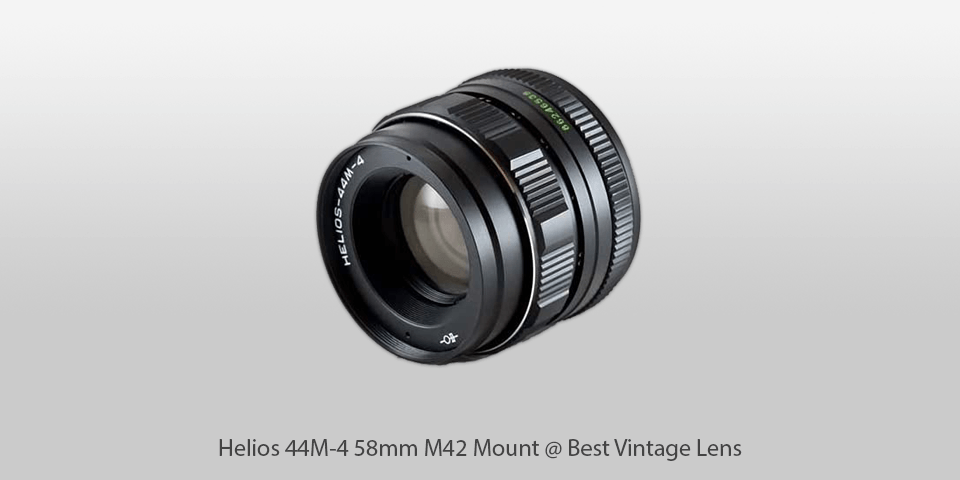
Mount: M| Diaphragm blades: 7 | Autofocus: good| Min focus distance: 0.5 m | Max magnification: 0.12x | Filter thread: 58 mm | Dimensions (WxL): 58 mm | Weight: 10.8 ounces
⊕ Beautiful bokeh
⊕ Detailed shots
⊖ Mount requires fussing with adapters
If you gather information about this model, you will find sharpness ratings of 8.4. However, the actual performance is even higher. If you combine it with an APS-C, the frames will be sharp and detailed. Some say there is blurriness towards the edge but there is an amount of it that’s inevitable due to those areas being actually farther away than the center.
If you open the diaphragm wide, the depth of field will become very thin and sensitive to the distance. A bit of adjusting can completely change that, giving the corners and center impressive sharpness. You only need to perfect your skill to get that at every shot.
| Image | Name | Features | |
|---|---|---|---|
 |
Nikon 35mm f/1.8G
Our choice |
CHECK PRICE → | |
 |
Voking 25mm f/1.7
Compact |
CHECK PRICE → | |
 |
Meike 50mm F2.0
High quality |
CHECK PRICE → |
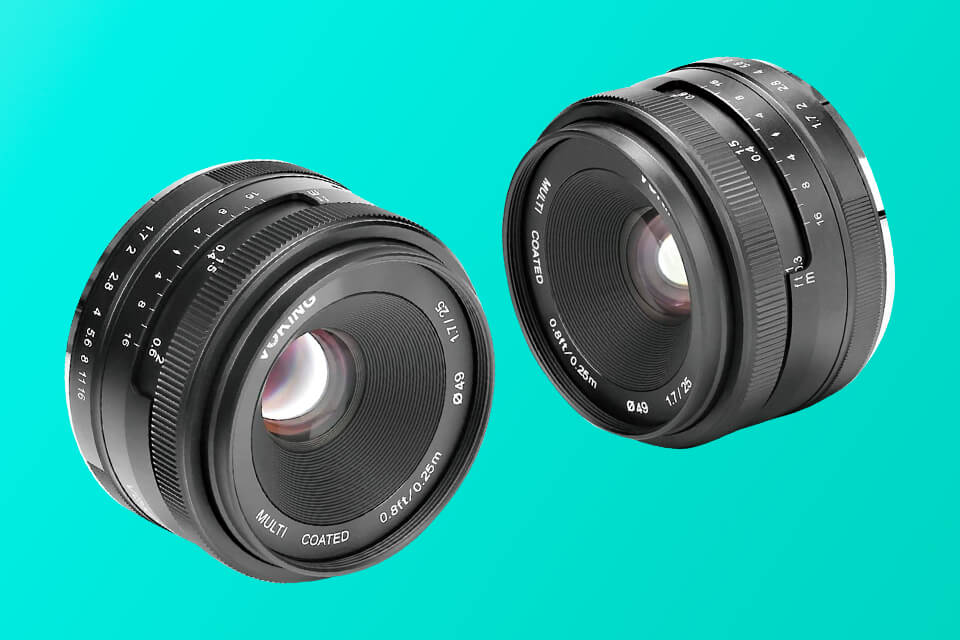
Just like modern camera manufacturers introduced a few different mounts, old lenses can come in varieties as well. Among the vintage lenses for video and photography, you will most frequently find the M42 mount. It can be described as a screw thread and was the common way to attach a lens to 35 mm cameras. There were other mounts, too, like those patented by the well-known brands. Your main rule in selecting an old lens for a modern camera would be the availability and reliability of adapters so investigate those before making a purchase.
The first necessary step is to set the smallest aperture value on the lens. With those vintage pieces, it can easily be as low as f/1.4 or somewhere around f/2.8, perhaps. You can actually flip the lens and look at how wide the diaphragm opened. You will have to couple that setting with a very fast shutter to make sure it is sharp enough. Start with 1/125, which should be enough to ignore minor camera shake, but some circumstances could require higher speeds.
If you find that a sharp shot is only obtainable at 1/2000 or even 1/4000, counterbalance that by lowering your ISO for a few notches. This combination of settings will result in a shallow depth of field and blur everything beyond the object in focus. Getting it right, though, will take some time and fidgeting with the settings. It does pay off to practice this beautiful technique so take many shots of various objects, even disregarding what you’re actually capturing.
If you want some deeper knowledge, though, keep in mind that the sharpest images are typically not possible with the widest aperture. To test that, crank your diaphragm a couple stops away from the smallest value and take another picture. The result will have slightly more depth of field and whatever is in focus will acquire even more details.
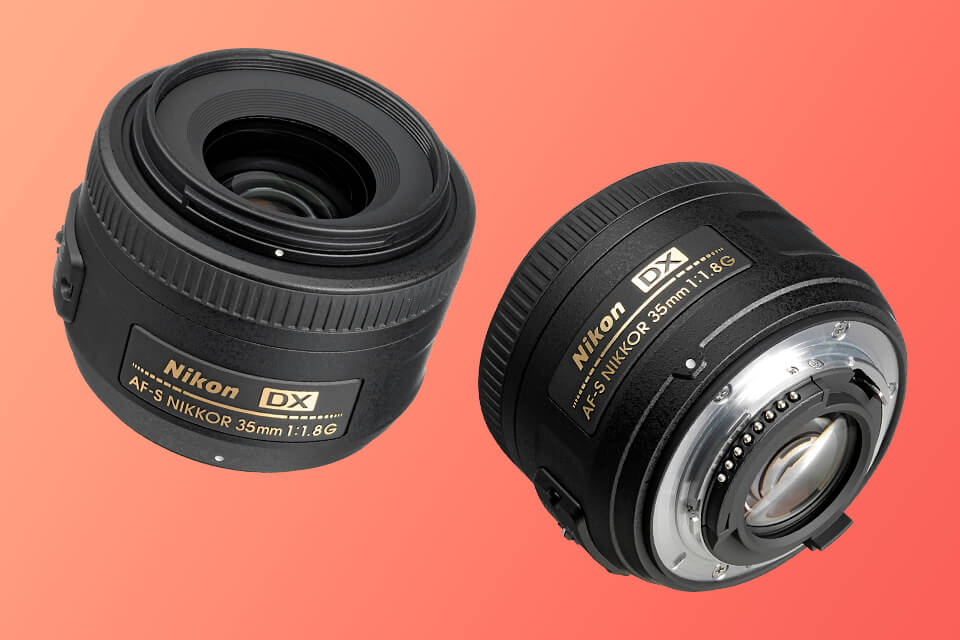
Even if you get the best vintage lenses, you can still end up with images inferior in quality to those shot with even a cheap modern kit lens. That would largely depend on the year but also the manufacturer. Such lenses are not typically sought-after for their quality these days, although some particular models have that unique recognizable look that professionals want to play with.
Normally, you would get a vintage lens for the unique experience of adjusting the optics to get a particular result. Some also hunt for the interesting-looking models but that’s a different story. If you want to know what an old lens of a particular model can do, there are plenty of sample images on the internet. For instance, follow the model name with the word “Flickr”, and among the results, you will see a link to this website where photographers put out personal shots indicating the gear they used.
These lenses are a great bootcamp for perfecting manual focusing. They train your eye to distinguish the smallest amount of focus shift and help to improve aiming. In addition, since the aperture is controlled with a ring on the lens itself, you get to see how deep or shallow the field of view is in real-time.
In some cases, the highest resolution obtainable plays the main role but since photography is a form of art, another goal might be set. You could want to capture frames with old lenses that create particular effects, so soft and attractive to the viewer’s eye.
These old optical devices can have certain qualities no longer obtainable with the modern ones. Some great examples of bokeh and flares can be found in the early lenses like the Helios 44-2 58mm/f2. The flares that rays of the sun used to create in analog photography are impossible to catch in such beauty now.
If you get vintage Nikon lenses, they will not mount on the modern cameras from the same brand easily unless you own an entry-level D3XXX and D5XXX series one. Even then, the camera will not be able to measure the amount of light. In other cases, you can always find an adapter to connect the old lens to a modern camera, even of a different brand.

 Rating
Rating